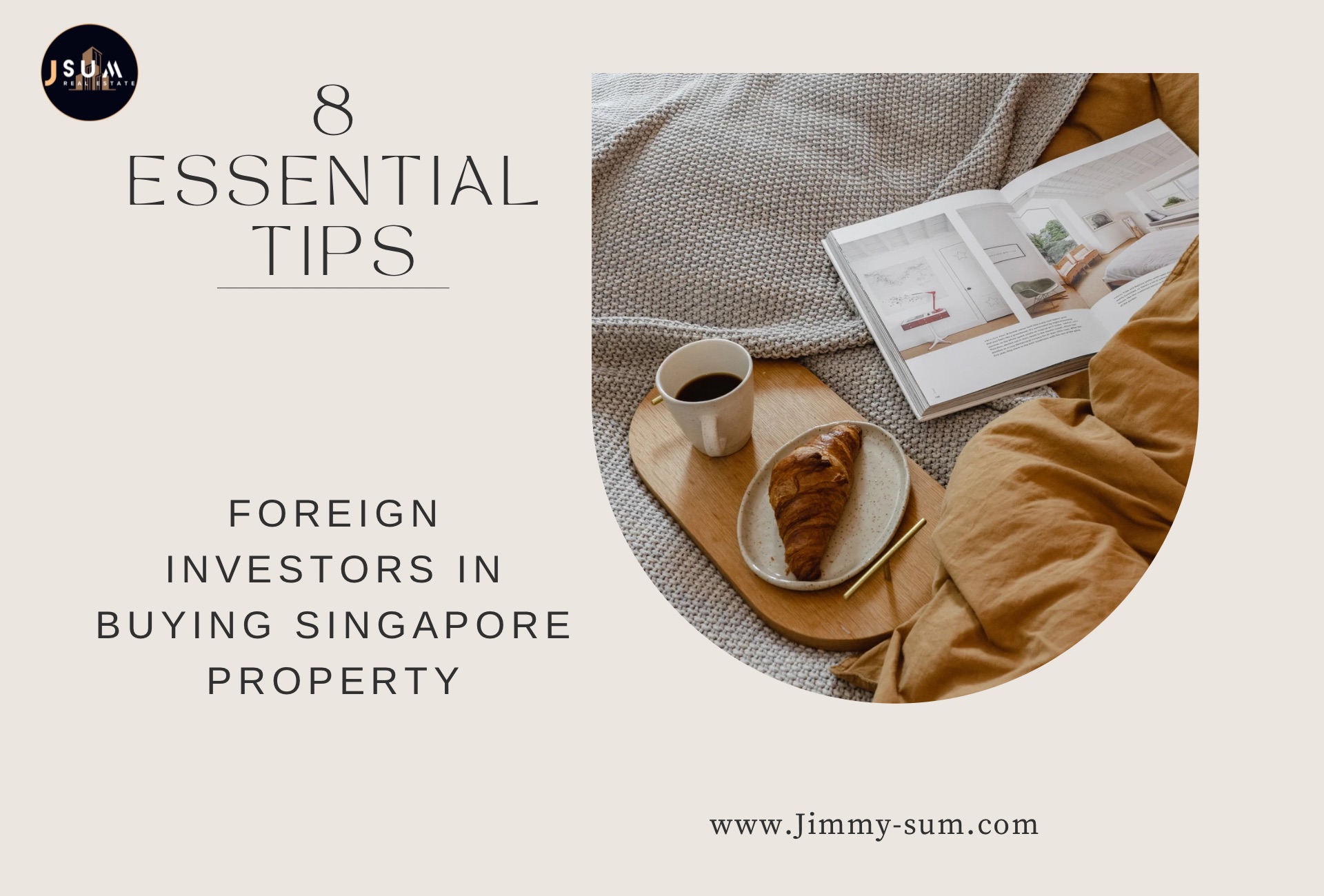Introduction
Are you dreaming of buying property in Singapore as a foreigner? You’re not alone. Singapore’s robust real estate market, stable economy, and vibrant lifestyle make it an attractive destination for international buyers. However, navigating the real estate landscape in a foreign country can be daunting and complex. In this blog post, we will provide you with essential tips and guidance to help make your property purchase in Singapore a successful and rewarding experience. Whether you’re a seasoned investor or a first-time buyer, these insights will empower you to make informed decisions and navigate the unique intricacies of Singapore’s property market with confidence.
#1: Understand the Regulatory Landscape
As a foreign investor, it’s crucial to have a clear understanding of the regulatory landscape in Singapore regarding property ownership. The government has implemented regulations, such as the Residential Property Act, to manage foreign ownership and safeguard the local property market. These regulations may impose certain restrictions on foreign investors, including eligibility criteria and additional fees or taxes.
To ensure a seamless and compliant property purchase, it is essential to research and familiarize yourself with these regulations. Seek professional advice from lawyers or property consultants like Jimmy Sum who specializes in real estate transactions for foreigners. They can help you navigate the legal requirements, ensure eligibility, and provide clarity on any additional fees or taxes like Additional Buyer’s Stamp Duty (ABSD) that may be applicable to your specific situation.
By understanding the regulatory framework, you can avoid potential pitfalls and make informed decisions throughout the buying process. Being well-informed also enables you to properly plan and budget for your investment.
#2: Engage a Qualified Real Estate Agent
Navigating the Singapore property market can be challenging, especially for foreign buyers. That’s why engaging a qualified and experienced real estate agent is crucial. A knowledgeable agent can provide valuable insights, guide you through the property selection process, and navigate the intricate details of real estate transactions in Singapore.
When choosing a real estate agent, look for someone who has expertise in working with foreign buyers and possesses comprehensive knowledge of the local market. They should be familiar with those top and popular neighborhoods, property types, and pricing trends. A reliable agent will also have a network of contacts, including developers, property owners, and other professionals, which can help you access a wide range of opportunities.
Your chosen agent should prioritize your needs and preferences, taking into account your budget, location preferences, and investment goals. They should listen attentively, clarify any doubts or queries, and provide comprehensive guidance throughout the property search and negotiation process.
Additionally, a qualified real estate agent can also assist with important paperwork, ensuring that you adhere to all legal requirements and contractual obligations. They will help you review and understand the terms and conditions, ensuring that everything is accurate and in compliance with Singapore’s property regulations.
By engaging a qualified real estate agent, you gain a trusted advisor who can offer you personalized guidance, expert insights, and a smoother journey through the Singapore property market.
#3: Research Suitable Locations and Property Types
Singapore is a diverse city-state with a wide range of neighborhoods and property types to choose from. It’s essential to conduct thorough research to identify the most suitable locations and property types based on your investment goals and preferences.
Consider factors such as proximity to amenities, transportation options, schools, and lifestyle conveniences when evaluating potential locations. Some areas, like the central business district or popular residential districts, may have higher property prices but offer higher rental yield potential. Meanwhile, emerging suburban areas may offer more affordable options with potential for future appreciation.
In addition to location, carefully consider the different property types available in Singapore. Options include condominiums, landed houses, and shophouses, each offering distinct advantages and considerations. Understand the benefits and limitations of each property type and how it aligns with your investment objectives.
Researching the market and specific locations will help you make more informed decisions when it comes to identifying properties that offer good value, potential growth, and alignment with your investment objectives. Combine your research with the guidance of a trusted real estate agent like Jimmy Sum to identify the best investment opportunities in your preferred locations.
#4: Budgeting and Financing
Setting a realistic budget is essential when buying property in Singapore as a foreign investor. Before starting your property search, carefully assess your financial situation, taking into account funds available for down payment, loan eligibility, and any additional costs associated with the purchase.
Start by determining the amount you can comfortably allocate towards the down payment, considering your personal financial circumstances and the minimum down payment required by lenders. In Singapore, a minimum 25% of the property value needs to be set aside for the down payment.
Next, explore your financing options. Research both local and international banks to understand the loan options available to foreign investors. Evaluate interest rates, loan terms, and the eligibility requirements for each option. It might be beneficial to seek the assistance of a mortgage broker who specializes in Singapore property loans and can help you find the most competitive rates that suit your needs.
Buying new condominium launches uses normal progressive scheme for payment where payment is made in stages and is normally spread across the number of years taken by developers to construct the development completely. Also, something to take note is that the tenure of properties impact on the prices as well. Freehold vs leasehold property, it will be good to understand which one suits you better.
By setting a realistic budget and evaluating your financing options, you can assess your affordability and make informed decisions when selecting a property. It’s crucial to balance your budgetary constraints with your investment goals, ensuring that you can comfortably manage the financial obligations associated with the property you choose.
#5: Consider Additional Costs and Fees
When buying property in Singapore as a foreign investor, it’s important to consider the various additional costs and fees associated with the purchase. These expenses can have a significant impact on your overall budget and should be factored into your financial planning.
One significant cost is the stamp duty, which breaks down into Buyer’s Stamp Duty and Additional Buyer’s Stamp Duty. They are taxes levied on property transactions. Their rates vary depending on the property’s market value and the buyer’s profile. Be sure to understand the prevailing stamp duty rates applicable to your specific situation to avoid any surprises.
Buyer’s Stamp Duty |
|
|
Property Price less than S$1M |
(3% x purchase price) – $5,400 |
|
Property Price S$1M and less than S$1.5M |
(4% x purchase price) – $15,400 |
|
Property Price S$1.5M and less than S$3M |
(5% x purchase price) – $30,400 |
|
Property Price S$3M and above |
(6% x purchase price) – $60,400 |
Additional Buyer’s Stamp Duty (ABSD) for Foreigners |
|
|
1st Property and thereafter |
60% |
However, good news is if you are a foreigner from these FTAs countries, you are exempt for paying the ABSD for your first property purchase in Singapore.
As a citizen or a permanent resident from these five countries, you receive the same kind of ABSD rate as local Singaporeans:
- Iceland
- Norway
- United States of America
- Switzerland
- Liechtenstein
ABSD for Local Singaporeans |
|||
|
|
1st Property |
2nd Property |
3rd Property |
|
ABSD for Spore Citizen |
0% |
20% |
30% |
Lastly, other fee to consider will be legal fees. Engaging the services of a lawyer (which is required in Singapore), who specializes in real estate transactions will incur legal fees. The legal cost is dependent on the complexity of the transaction.
It’s also important to account for ongoing maintenance charges such as property management fees, utilities, and sinking fund contributions if you are buying into a strata-titled development like a condominium. These charges enable the upkeep of common areas and facilities within the development.
By considering these additional costs and fees upfront, you can develop a comprehensive budget and avoid any unexpected financial strain during the property buying process. Research and consult with professionals to get accurate estimates of these costs and incorporate them into your financial plan.
#6: Legal Assistance and Due Diligence
Engaging legal assistance is crucial to protect your interests and ensure a smooth and legally compliant property purchase in Singapore. A qualified lawyer who specializes in real estate transactions can provide valuable guidance and help you navigate the legal complexities of the process.
Your lawyer’s primary role is to review and verify all legal documentation related to the property. They will ensure that the property has clear ownership and that there are no outstanding encumbrances or legal issues that may affect your ownership rights. Your lawyer will also review purchase agreements, sales contracts, and other legal documents to ensure there are no undue risks or discrepancies.
Given that Singapore’s property market operates under a system of caveat emptor (“buyer beware”), conducting thorough due diligence is of utmost importance. The conveyancing process that your lawyer will undertakes include for instance, conducting property searches, verifying land titles, and liaising with relevant government agencies to ensure the legitimacy of the property and uncover any potential risks.
Additionally, your lawyer will guide you through the process of transferring ownership and attending to all necessary legal procedures, including paying stamp duties and registering the property under your name with the relevant authorities.
By enlisting the help of a qualified lawyer, you can have peace of mind knowing that your property purchase is legally sound and backed by professional expertise. Their assistance will minimize the risk of encountering legal pitfalls or complications throughout the buying process.
#7: Resale Potential and Investment Returns
As a foreign investor in the Singapore property market, it’s crucial to consider the resale potential and expected investment returns of the property you are considering. While there are no guarantees, evaluating these factors can help inform your decision-making process and potentially maximize your investment returns.
When assessing the resale potential, consider factors such as location, proximity to amenities, transportation networks, and future development plans in the area such as the Greater Southern Waterfront. New condo developments like Avenue South Residences or One Pearl Bank which are located close to such mega transformation will tend to receive positive potential capital appreciation as it can significantly impact the demand and desirability of these properties in the future.
Examining the rental market is also important, particularly if you plan to generate rental income from the property. Look at rental yields in the area, the tenant profile, and rental demand for properties of a similar type in the vicinity. Understanding the rental market dynamics can help you gauge the income potential of your investment.
It’s also beneficial to evaluate the historical price trends in the neighborhood and the overall property market to identify patterns and potential future growth. Review data on past property price appreciation and consult with property consultants to gain insights into expected long-term price trends.
However, it’s important to note that property investments come with inherent risks and that past performance is not a guarantee of future returns. By considering the resale potential and investment returns, you can align your investment goals with the property’s long-term prospects. This approach will help you make a sound investment decision and optimize your chances of achieving your desired financial outcomes in the Singapore property market.
#8: Building a Local Support Network
When buying property in Singapore as a foreign investor, it’s essential to build a local support network to ensure a successful property ownership experience. This network consists of professionals who can assist you throughout the property ownership journey and help navigate any challenges that may arise.
One important member of your support network is a reputable property manager who can be represented by your trusted real estate agent as well. A property manager can handle day-to-day property management tasks like tenant sourcing, rent collection, and maintenance coordination. They act as your local representative, ensuring the smooth operation and optimal performance of your property investment.
Additionally, it is advisable to seek the assistance of tax advisors who specialize in cross-border property investments. They can provide guidance on tax implications, compliance requirements, and help you optimize your tax position as a foreign investor.
Beyond professionals, consider building connections with fellow expats or local residents who have experience in the Singapore property market. Their firsthand knowledge can provide valuable insights and advice, especially if they have gone through a similar property ownership journey.
By building a local support network, you gain access to expertise and resources that can enhance your property ownership experience. These professionals and connections can guide you through challenges, offer valuable advice, and help you make informed decisions throughout your property investment journey.
Conclusion
Buying property in Singapore as a foreign investor can be a rewarding and lucrative venture, but it is essential to navigate the process strategically and responsibly. This blog post has provided essential tips and guidance to help you make informed decisions and successfully navigate the intricacies of Singapore’s property market.
Understanding the regulatory landscape, engaging a qualified real estate agent, and conducting thorough research on suitable locations and property types lay the foundation for a successful property purchase. Proper budgeting and financing, along with legal assistance and due diligence, ensure that you approach the process with clarity and confidence.
Considering additional costs and fees, as well as evaluating the resale potential and investment returns, helps you plan accordingly and maximize the potential for financial success. Lastly, building a local support network establishes valuable connections and resources to assist you throughout your property ownership journey.
With thorough planning, diligent research, and the support of professionals, you can make informed investment decisions and navigate the Singapore property market as a foreign investor. Remember, each investment is unique, so it is essential to consider your own financial circumstances, investment goals, and seek appropriate professional advice tailored to your specific situation.
Unlock the potential of Singapore real estate – Contact me at +65 90918188 to connect with me and start your investment journey today.




